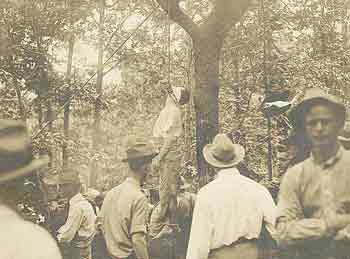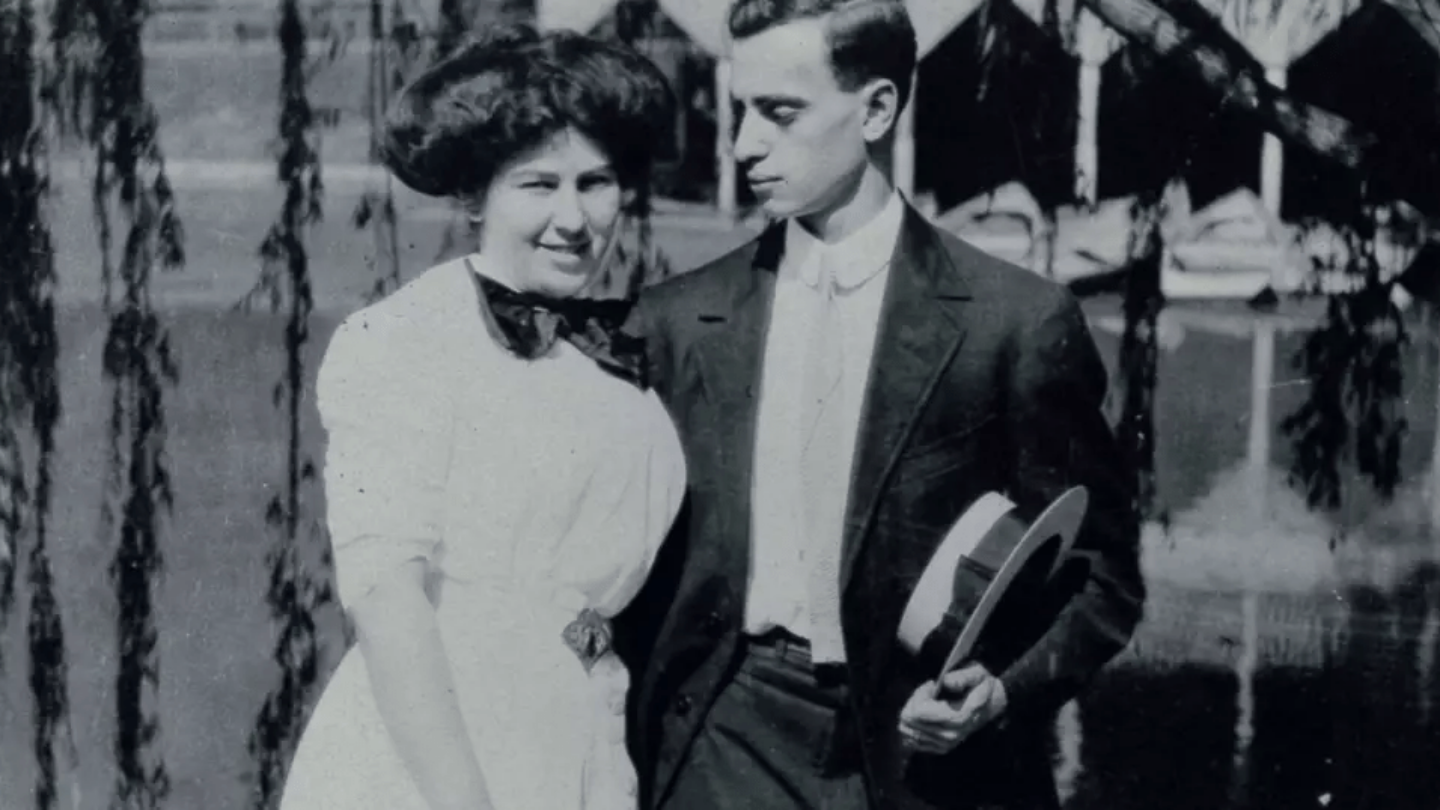Jewish Group
Related: About this forum(Jewish Group) Today in Jewish-American History: Leo Frank was lynched.
Leo Max Frank (April 17, 1884 – August 17, 1915) was an American factory superintendent who was convicted in 1913 of the murder of a 13-year-old employee, Mary Phagan, in Atlanta, Georgia. His trial, conviction, and appeals attracted national attention. His kidnapping from prison and lynching two years later, in response to the commutation of his death sentence, became the focus of social, regional, political, and racial concerns, particularly regarding antisemitism and racism. Today, the consensus of researchers is that Frank was wrongly convicted and Jim Conley was likely the actual murderer.[n 1][2]
Born to a Jewish-American family in Texas, Frank was raised in New York and earned a degree in mechanical engineering from Cornell University before moving to Atlanta in 1908. Marrying in 1910, he involved himself with the city's Jewish community and was elected president of the Atlanta chapter of the B'nai B'rith, a Jewish fraternal organization, in 1912. At that time, there were growing concerns regarding child labor at factories. One of these children was Mary Phagan, who worked at the National Pencil Company where Frank was director. The girl was strangled on April 26, 1913, and found dead in the factory's cellar the next morning. Two notes, made to look as if she had written them, were found beside her body. Based on the mention of a "night witch", they implicated the night watchman, Newt Lee. Over the course of their investigations, the police arrested several men, including Lee, Frank, and Jim Conley, a janitor at the factory.
On May 24, 1913, Frank was indicted on a charge of murder and the case opened at Fulton County Superior Court, July 28, 1913. The prosecution relied heavily on the testimony of Conley, who described himself as an accomplice in the aftermath of the murder, and who the defense at the trial argued was, in fact, the perpetrator of the murder. A guilty verdict was announced on August 25. Frank and his lawyers made a series of unsuccessful appeals; their final appeal to the Supreme Court of the United States failed in April 1915. Considering arguments from both sides as well as evidence not available at trial, Governor John M. Slaton commuted Frank's sentence from capital punishment to life imprisonment.
more at source
....
For the grand jury, Hugh Dorsey painted Leo Frank as a sexual pervert who both was homosexual and preyed on young girls. What he did not tell the grand jury was that a janitor at the factory, Jim Conley, had been arrested two days after Frank when he was seen washing blood off his shirt. Conley then admitted writing two notes found by Mary Phagan's body. The police assumed that, as author of these notes, Conley was the murderer; but Conley claimed, after apparent coaching from Dorsey, that Leo Frank had confessed murdering Mary in the lathe room and paid Conley to pen the notes and help him move Mary's body to the basement.
Even after Frank's housekeeper placed him at home, having lunch, at the time of the murder and despite gross inconsistencies in Conley's story, both the grand and trial jury chose to believe Conley This was a rare instance of a Southern black man's testimony being used to convict a white man. In August of 1913, the jury found Frank guilty in less than four hours while crowds outside the courthouse shouted, “Hang the Jew.” Historian Leonard Dinnerstein reports that one juror had been overheard to say before his selection for the jury, “I am glad they indicted the G-d damn Jew. They ought to take him out and lynch him. And if I get on that jury, I'll hang that Jew for sure.”
Facing intimidation and mob rule, the judge sentenced Frank to death. He did not allow Frank in the court room on the grounds that, had he been acquitted, Frank might have been lynched by the crowd outside.

Lynching of Leo Frank, Marietta, Georgia
August 17, 1915. Postcard, gelatin silver print. Library of Congress Prints and Photographs Division
Despite these breaches of due process, Georgia's higher courts rejected Frank's appeals, and the U. S. Supreme Court voted, 7-2, against reopening the case, with justices Holmes and Hughes dissenting. Frank's survival depended on Georgia governor Frank Slaton. After a 12-day review of the evidence and letters recommending commutation from the trial judge (who must have had second thoughts) and from a private investigator who had worked for Hugh Dorsey, Slaton commuted Frank's sentence to life imprisonment. That night, state police kept a protesting crowd of 5,000 from the governor's mansion. Wary Jewish families fled Atlanta. Slaton held firm. “Two thousand years ago,” he wrote a few days later, “another Governor washed his hands and turned over a Jew to a mob. For two thousand years that governor's name has been accursed. If today another Jew [Leo Frank] were lying in his grave because I had failed to do my duty, I would all through life find his blood on my hands and would consider myself an assassin through cowardice.” A year later Dorsey soundly defeated Slaton's bid for reelection.
Soon after the commutation, on August 17, 1915, a group of 25 men, described by peers as “sober, intelligent, of established good name and character“ stormed the prison hospital where Leo Frank was recovering from having his throat slashed by a fellow inmate. They kidnaped Frank, drove him more than 100 miles to Mary Phagan's hometown of Marietta, Georgia, and hanged him from a tree. Frank conducted himself with dignity, calmly proclaiming his innocence. Townsfolk were proudly photographed beneath Frank's swinging corpse, pictures still valued today by their descendants.
more at source
Trial and Lynching of Leo Frank: Topics in Chronicling America
Convicted of the April 1913 murder of 13-year-old factory worker Mary Phagan in Atlanta, Georgia, Jewish-American businessman Leo Frank appeals his conviction for the next two years. The U.S. Supreme Court eventually rejects Frank's final appeal in April 1915. On August 17, 1915 a mob of men abduct and lynch Leo Frank near Marietta, Georgia. Leo Frank's case energized the press, resulting in nationwide coverage of the trial and Frank's eventual death. Read more about it!
The information in this guide focuses on primary source materials found in the digitized historic newspapers from the digital collection Chronicling America.
The timeline below highlights important dates related to this topic and a section of this guide provides some suggested search strategies for further research in the collection.
more at source
The Life and Times of Lucille and Leo Frank

Lucille Selig Frank and Leo Frank in Grant Park, July 1909, courtesy of The Breman Museum, from the Maxine and Harold Marcus Family Papers Collection, MHM 96.014
Lucille Selig was born in Atlanta in 1888 to a prominent Jewish family. Her maternal grandfather, Levi Cohen, was the co-founder of the Temple, the city’s reform synagogue. Her uncle, Simon Selig, owned a thriving Atlanta business called West Disinfecting, where Lucille’s father worked. And other family relatives owned and operated successful clothing and department stores in Atlanta and Athens, Georgia.
Despite these family connections to wealth and prominence, Lucille Selig joined the work force after graduating from Atlanta’s Girl’s High School in 1906. Drawing on the secretarial skills she was taught in school, Lucille was employed first as a stenographer at the Jewish-owned Atlanta Paper Mills Company and later in a similar position at the regional offices of Swift Meats.
On November 30, 1910, Lucille Selig married Leo Frank, a factory superintendent from Brooklyn and a graduate of Cornell University. The wedding took place in the home of Lucille’s parents and was presided over by Dr. David Marx, the rabbi of the Temple. The first years of Lucille and Leo’s marriage were, by all accounts, happy and without incident. As Lucille later recalled “I suppose there are many husbands in the world as good as Leo, and it may be therefore that I am foolishly fond of him. But he is my husband, and I have the right to love him very much indeed and I do. If I make too much of him, perhaps it is because he has made too much of me.”
more at source
What Ben Platt learned reading Leo Frank’s letters

Ben Platt as Leo Frank. Photo by Emilio Madrid
Eight times a week, Ben Platt spends around 15 minutes writing onstage at the Bernard B. Jacobs Theatre in the musical Parade. Somehow he knew to write in cursive.
Confined to a jail cell in the role of Leo Frank, Platt jots down whatever’s going through his head in the moment — that the audience is good that night, that his co-star Micaela Diamond made him laugh in the previous scene, that a song went really well. As Platt writes, in a notebook he hopes to keep at the end of the show’s run, his character is fighting for his life.
Frank, a pencil factory supervisor sentenced to death for the murder of a 13-year-old employee, spent two years in prison working to appeal his conviction, writing countless letters to well-wishers who believed in his innocence. Frank’s sentence was commuted to life in prison in 1915, and then an antisemitic lynch mob hanged him that August. Frank’s case was a flashpoint, birthing the Anti-Defamation League and the revival of the Ku Klux Klan. Doomed to become a martyr, Frank’s letters speak to something unexpected: hope.
Platt, 29, the same age Frank was when he was arrested, walks into the YIVO Institute for Jewish Research wearing a brown corduroy jacket, white Reeboks, white pants and a white T-shirt adorned with abstract art (“a thrift shop purchase,” he says). He snaps a picture of YIVO’s current exhibit, “Am Yisrael High,” about Jews and cannabis, and sends it to his fiancé, the actor Noah Galvin.
more at source
X-posted in General Discussion
Ziggysmom
(3,407 posts)and the Georgia prison allowed the lynch mob to enter. The prison staff were in on it and should have been prosecuted.
His poor wife...... I have no words......
Mosby
(16,314 posts)It's so important, now more than ever, to spread the truth about the kidnapping and lynching of Leo Frank.
Thanks BtA.